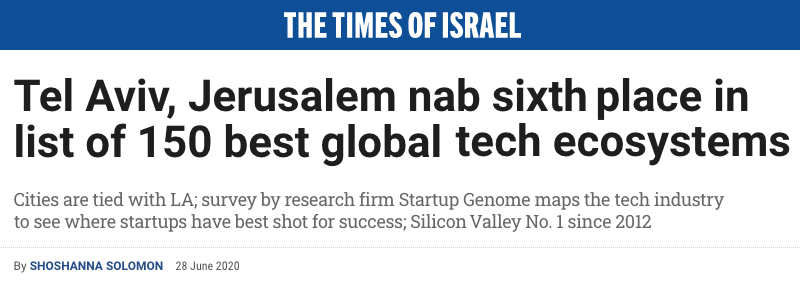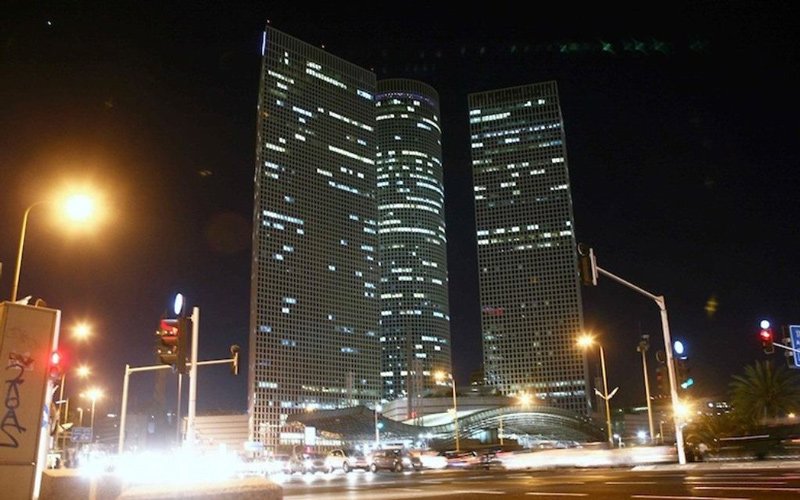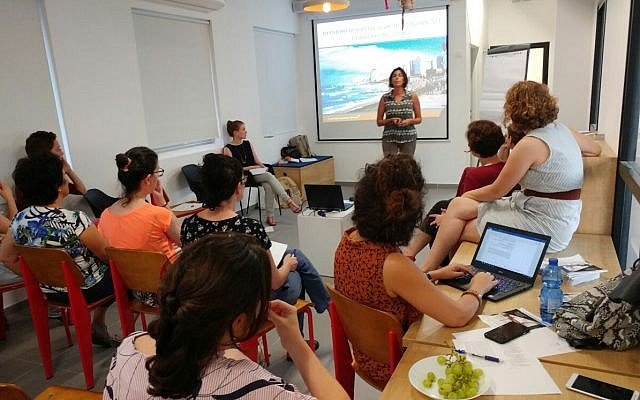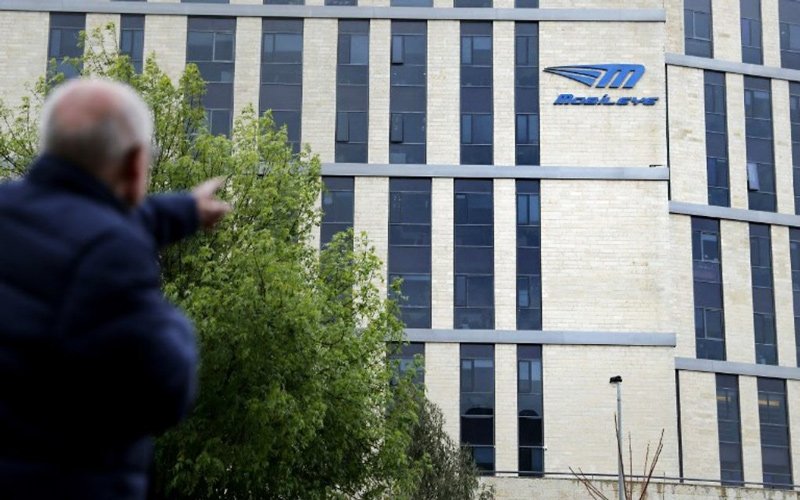

Tel Aviv and Jerusalem are ranked together as the sixth most attractive ecosystem for startups and innovation by a global survey held by research firm Startup Genome. The study maps the global startup industry in over 150 cities worldwide.
 The two Israeli cities are tied with Los Angeles, which also takes sixth place on the list.
The two Israeli cities are tied with Los Angeles, which also takes sixth place on the list.
California’s Silicon Valley maintains its first-place position in this year’s report, followed by New York City and London, which are tied. Beijing and Boston rank fourth and fifth, respectively.
The Startup Genome Ecosystem report, published annually since 2012, is a comprehensive study of the global startup scene, and comes this year as 40 percent of the startups across the globe report disruptions to their operations due to the COVID-19 spread.

The higher the ranking the better the shot of an early-stage startup at building global success, according to the Startup Genome’s model.
For the 2020 ranking, the research firm measured six success factors: performance, which takes into account the number and growth of exits and how many startups succeed; access to and quality of funding; market reach, or the ability to tap global markets; how easy it is to recruit top talent; how connected startups are to others in the ecosystem; and knowledge, a measure of publication impact and patents.
Silicon Valley scored 10 in all of these success factors except connectedness, where it got a score of 8, while Tel Aviv and Jerusalem scored nine in performance and funding, 10 in market reach, eight in connectedness, nine in talent and four in knowledge.
The top ten list concludes with Shanghai, Seattle, and Stockholm, Startup Genome said in a statement on Sunday.
For the second year running, the top seven ecosystems have remained unchanged, the report said, with Silicon Valley ranked at the top position since 2012, when Startup Genome’s first ranking was released.
London has crept up from eighth in 2012 and third, tied with Beijing, in 2019, to share second place with New York this year.
The section devoted to Tel-Aviv – Jaffa points out that the city’s main strengths include AI, big data, and cloud technologies, which account for almost 41% of the startup companies. Cybersecurity is also a strong suit of Tel Aviv’s ecosystem, accounting for $3.4 billion in exits, either initial public offerings or merger and acquisition deals in 2019, the report said.

Some 100 multinationals have opened their development and innovation centers in Tel Aviv for human resources considerations. Some of the multinationals attracted to Tel Aviv in 2019 include the Ford Motor Company, Yandex, and SAP, which established its innovation lab in Tel Aviv.
The city of Tel Aviv operates municipal entrepreneurship and innovation centers that provide accelerator programs, support, and mentoring from the earliest stages, as well as opportunities to implement their developments in the City Hall or municipal companies. Examples include the Ratzif Innovation Center in Naveh Shaanan in the south of Tel Aviv, and CityZone in Kiryat Atidim, which specializes in technologies that address urban and smart city challenges.
The Jerusalem section of the report highlights the life science, biotech, and AI strengths of Israel’s capital. Some 150 life science companies in Jerusalem benefit from a municipal support net. Examples include the BioHouse work compound at the Hadassah Medical Center Campus in Ein Kerem, and BioGiv, a lab compound for young companies in the Givat Ram campus of the Hebrew University.
Jerusalem also boasts some 80 AI companies, including Mobileye and Lightricks, the statement said. Jerusalem’s technological edge in general, and biotech and AI, in particular, relies heavily on its academic institutes, such as the Hebrew University and the Bezalel Academy of Arts and Design, as well as a growing local community and significant state and municipal support.

Recent years have seen the Jerusalem high-tech scene developing at an “unprecedented pace,” the statement said. “Within a few years, Israel’s capital has become a startup and innovation incubator,” partly due to efforts by the Jerusalem Development Authority, the Ministry of Jerusalem and Heritage, and the Municipality of Jerusalem.
Approximately 500 technology companies are headquartered in Jerusalem today, the statement said.
In May, a report by Start-Up Nation Central said that Jerusalem has become “a magnet for entrepreneurial activity and cutting-edge innovation” due to its diverse population, made up of secular and religious people, Jews and Arabs, new immigrants, men and women.